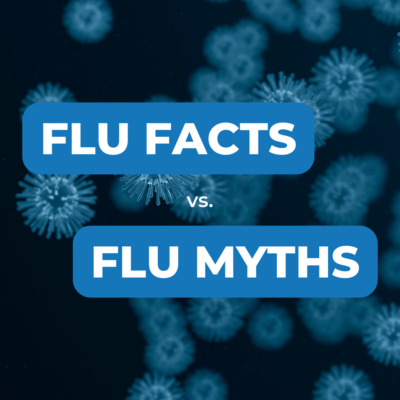Flu Facts vs Myths

“Getting the flu vaccine caused me to get sick.”
“I’m healthy – I don’t need a flu shot.”
“It’s just the flu – it’s like a bad cold.”
You have probably heard something like this before when speaking with friends, family, or coworkers about the flu. While some may brush it off as being not so serious, the truth is influenza (flu) is a highly contagious viral infection that can cause mild to severe illness and can result in complications that can lead to hospitalization or death. It impacts everyone – regardless of age or health status: the CDC estimates that each flu season, between 5 and 20 percent of the U.S. population is infected with the flu virus, and approximately 8 percent experience flu illness. Influenza is also one of the deadliest vaccine-preventable diseases in the U.S. The following are some common flu myths and facts to stay informed and fight the flu.
Myth: The flu vaccine causes the flu
Fact: You can’t get flu from the flu vaccine
You cannot get the flu from the flu vaccine – the shot is made from an inactivated virus that can’t transmit infection. Sometimes, side effects from the vaccine happen, but this should not be confused with being injected with the flu. Side effects may include a slight fever, aches, or fatigue. This just means your immune system is learning to fight off the flu!
In certain cases, you could have been exposed to the flu virus before you were protected by the vaccine, as the vaccine can take up to two weeks for your body to build the proper immune response to help prevent the flu.
And finally, if you are experiencing symptoms after being vaccinated, you may be suffering from another infection that is not the flu. This is why it is important to get tested!
Myth: Healthy and young people don’t need a flu shot
Fact: Everyone is at risk for being infected with the influenza virus, and anyone can spread the disease to others
According to the CDC, everyone 6 months and older should get a flu vaccine every flu season. The flu does not discriminate; every year, otherwise, healthy individuals of all ages suffer complications from the flu that result in hospitalization and death. Just read the emotional stories of families whose lives have been permanently altered by the flu. Influenza is one of the deadliest vaccine-preventable diseases in the U.S. It’s safe and proven to be the most important step to prevent getting and spreading the flu.
While everyone is susceptible to the flu, it is especially dangerous for the following people:
- Children Under 5
- Seniors Ages 65+
- Pregnant Women
- People with certain chronic conditions such as diabetes, asthma, heart disease or cancer.
There are also different types of flu vaccines, including the nasal spray flu vaccine. This is administered intranasally, which means that the vaccine is sprayed up the nose as opposed to being injected with a needle. This can be a good alternative for those who may be afraid of needles. Learn more about the different options, and always ask your healthcare provider what is best for you.
Myth: I had my flu shot last year, so I don’t need one again this year
Fact: It’s recommended to get your flu shot every year, ideally in October
Because flu viruses are constantly changing, flu vaccines are updated from one season to the next to protect against the flu types that are most likely to make people sick. Unlike other vaccines, flu vaccines are not intended to last longer than one year. It’s essential to make this a yearly priority.
Myth: It’s just the flu, it’s like a bad cold
Fact: The flu is a serious and illness and highly contagious illness and can result in complications that can lead to hospitalization or death
Influenza is more than a ‘bad cold.’ In fact, the CDC estimates that each year, there are 140,000 – 710,000 hospitalizations (about 20,000 of those hospitalized are children under the age of 5) and 12,000 – 52,000 deaths (including approximately 100 children). As of December 10, 2022, 30 influenza-associated pediatric deaths have been reported for the 2022-2023 season.
One death from the flu is too many and sadly, influenza causes hundreds of thousands of hospitalizations and tens of thousands of deaths each year. No one should have to experience the serious complications that the flu can cause, especially when proven and effective vaccines are readily available.
Fight the flu and get vaccinated. This simple step could save your life.

